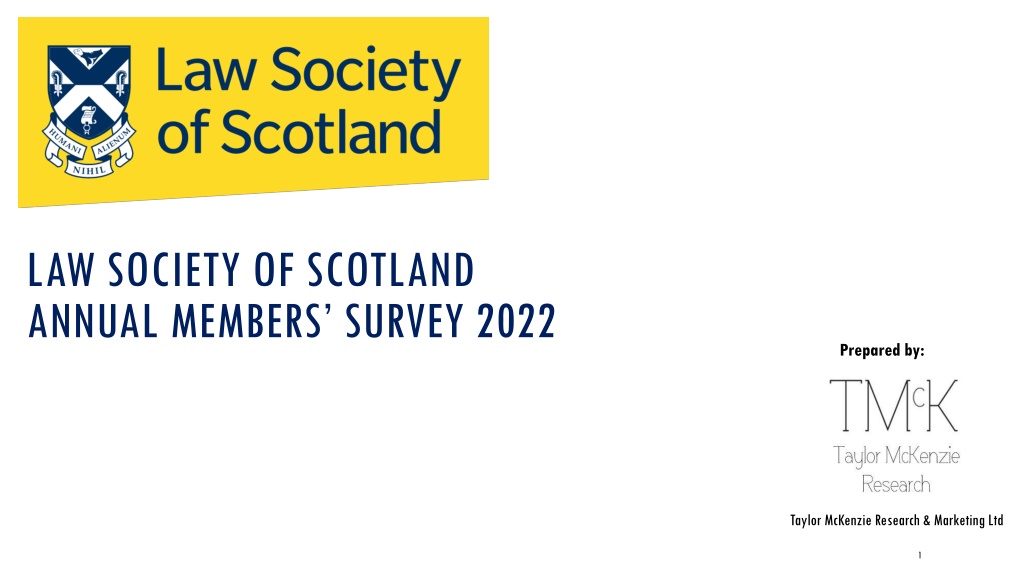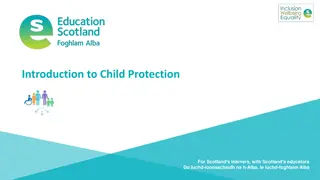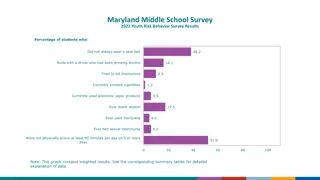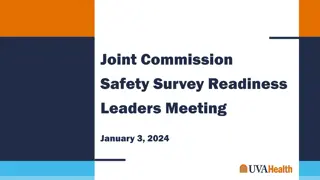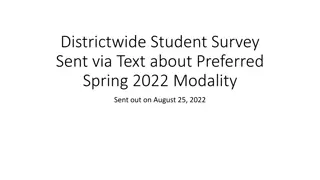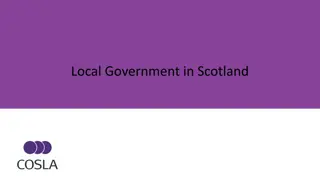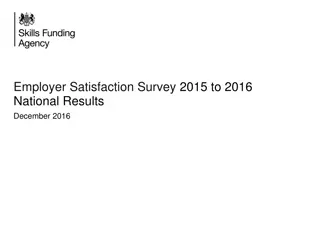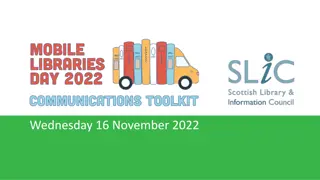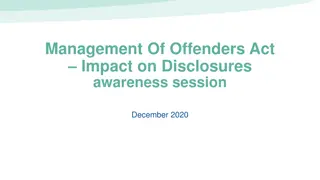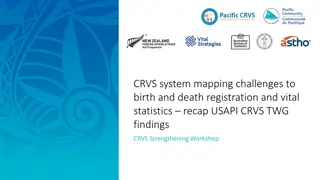Law Society of Scotland Annual Members Survey 2022 Findings and Priorities
The Law Society of Scotland conducted its annual members survey in 2022 to gather insights on members' perceptions, priorities, and challenges. The survey aimed to explore views on the Society's role, services, and future objectives. Findings indicate interventions in firms with critical failures as a top priority, with shifts in members' perspectives on various aspects. The survey also highlighted areas such as legal technology, mental health support, and equality promotion as significant concerns for members.
Download Presentation

Please find below an Image/Link to download the presentation.
The content on the website is provided AS IS for your information and personal use only. It may not be sold, licensed, or shared on other websites without obtaining consent from the author. Download presentation by click this link. If you encounter any issues during the download, it is possible that the publisher has removed the file from their server.
E N D
Presentation Transcript
LAW SOCIETY OF SCOTLAND ANNUAL MEMBERS SURVEY 2022 Prepared by: Taylor McKenzie Research & Marketing Ltd 1
BACKGROUND Each year the Society survey its membership to gain a better understanding of their views on the role and priorities of the Society and perceptions of current issues facing the profession. The aim of the research was to explore members perceptions of the Society, the service it provides and its priorities for the future. Members were contacted via email from a database provided by the Society. Interviews were conducted online from Monday, 12 December 2022 to Friday, 6 January 2023. In total, 1,268 interviews were completed. The achieved sample split was very closely matched to the Society s membership base. Weighting was applied to the sample to match gender, position, member type and type of firm or organisation to ensure it was fully representative of the membership population. The weighting achieved an efficiency rating of 96%, indicating a very representative dataset. This survey was conducted fully online. It was a change in terms of methodology with previous versions of the annual members survey, which were conducted hybrid (online and by telephone) or fully by telephone. The online self-completion approach allows participants to have clearsight of the rating scale and therefore able to make a more informed and private response. 2
PRIORITIES REPUTATION & REPRESENTATION Intervening in firms where a critical failure has been identified remains the highest priority again this year and is one of only 2 aspects where the number of members thinking it a high priority has increased (the other being improving perceptions of the Society among the general public). There have been notable declines in the numbers of members deeming aspects a high priority, most significantly on providing advice and support for trainees and providing networking/professional development events 2% -7% -10% -15% N/A Change vs 2022 2% -2% -3% -4% -5% -5% -6% -7% -8% -8% -16% 1.6% 0.8% 0.4% 1.2% 0.2% 0.5% 0.5% 0.6% 0.9% 1.1% 0.1% 2.4% 0.4% 0.4% 2.6% 1.9% 6.0% 16.1% 31.1% 5.0% 4.0% 9.4% 15.4% 40.0% 16.9% 6.9% 22.8% 45.5% 2.2% 8.2% 4.6% 17.7% 19.1% 33.2% 28.6% 33.9% 35.0% 45.3% 43.8% 50.4% 38.3% 42.1% 50.7% 44.9% 47.6% 53.7% 78.3% 45.5% 64.2% 42.8% 62.4% 60.8% 54.5% 48.6% 48.2% 44.0% 41.9% 39.6% 35.4% 33.0% 28.4% 14.8% 13.7% 10.1% Creating business development opportunities for the profession, at home and abroad, through cross- sector collaboration Leading the profession on legal technology Providing networking and professional development events for members, including specialist accreditation or Solicitor Advocate accreditation Providing resources and support on mental health and wellbeing Providing quality training and CPD for members Improving the perception of the profession among the general public Providing advice and support for trainee solicitors, solicitors and those interested in a career in law Promoting fundamental principles such as human rights and the rule of law Promoting equality, diversity and inclusion in the profession Inspecting firms to ensure compliance with accounting and AML rules Responding to Scottish and UK law reform proposals Investigating conduct complaints against solicitors and prosecuting cases to the discipline tribunal Providing professional practice advice to members Setting standards for solicitors and updating practice rules Protecting the legal aid budget and representing those solicitors working in legal aid Intervening in firms where a critical failure has been identified High priority Medium priority Low priority Don't know/ prefer not to answer Higher Priority Lower Priority 3
PRIORITIES ISSUES AFFECTING THE PROFESSION All issues affecting the profession are deemed to be less of a priority than last year. Regulatory compliance remains the key high priority issue again this year (and is now equally matched as a high priority by the issue of addressing bullying, harassment and sexual harassment) -4.9% -9.9% -10.9% -11.1% -12.6% -13.0% -13.4% -28.0% High Priority Change vs 2022 0.4% 0.6% 0.6% 0.6% 1.1% 1.3% 2.1% 2.5% 5.8% 9.5% 13.2% 18.2% 20.1% 23.4% 25.0% 32.1% 42.2% 40.0% 35.2% 43.7% 41.8% 47.9% 45.3% 47.3% 51.4% 51.1% 50.1% 36.9% 36.1% 28.6% 28.0% 18.0% Recovery from the Covid-19 pandemic Providing resources to support mental health and wellbeing Establishing family-friendly working practices Progression within the profession, in particular for women and those from an ethnic minority background Ensuring the profession is inclusive and reflects Scotland's population Ensuring the most talented individuals can access the profession regardless of financial circumstances Addressing bullying, harassment and sexual harassment Regulatory compliance High priority Medium priority Low priority Don't know/prefer not to answer Higher Priority Lower Priority 4
PERCEPTIONS OF THE SOCIETY The most widely held belief is that the Society should continue to be responsible for representation, support and regulation of solicitors in Scotland and there is a high level of agreement that the Society is an effective regulator (although to a lesser extent than last year). Few members hold a strong belief that the Society is focused on the issues affecting them in their profession or that they benefit from the Society s work % Agreeing Change vs 2022 -3% -4% -6% -8% -8% -8% N/A -14% 6% 9% 9% 10% 10% 10% 10% 3.5% 5.7% 3.5% 5.8% 3.5% 6.6% 7.2% 8.9% 29% 10.8% 12.2% 17.2% 16.4% 21.8% 3.0% 28.7% 43.5% 11.0% 57.6% 57.5% 57.5% 56.4% 54.3% 48.4% 49.8% 41.6% 17.8% 16.5% 11.1% 10.8% 8.5% 6.7% 3.4% The Society is focused on the issues that affect me as a solicitor The Society's education and training standards are flexibly applied and promote equal access I benefit from the work of the Society The Society is effective at representing the legal profession The Society is effective at supporting the legal profession The Society is helpful and approachable The Society is an effective regulator of the solicitor profession The Society should continue to be responsible for representation, support and regulation of solicitors in Scotland Strongly agree Tend to agree Tend to disagree Strongly disagree Don't know/prefer not to answer Higher Agreement Lower Agreement 5
FAVOURABILITY - THE WORK OF THE SOCIETY The work of the Society is viewed less favourably this year compared to 2022 (and indeed favourability has significantly declined over the last 5 years) 87% 90% 71% 51% % Favourable 1% 1% 3% 3.2% 6% 7% 8% 2% 10.9% 7% 17% 34.2% 72% 70% 58% 43.9% 18% 17% 13% 6.7% 2018 2019 2022 2023 Very favourable Fairly favourable Neither favourable nor unfavourable Fairly unfavourable Very unfavourable Don't know/prefer not to answer 6
LEGAL AID SUSTAINABILITY Very few members view Legal Aid as sustainable (particularly Criminal Legal Aid) and the number of members believing it to be sustainable has dropped compared to last year 7.7% 4.5% 7.6% % Sustainable Change vs 2022 -3.1% -4.3% -5.9% 44.4% 46.6% 55.7% 15.5% 24.3% 10.8% 23.9% 18.9% 21.6% 7.2% 6.2% 5.1% 7.2% 7.0% 3.8% 0.7% Criminal 0.6% Children's 0.5% Civil Very sustainable Sustainable Neither sustainable nor unsustainable Unsustainable Very unsustainable Don't know/prefer not to answer 7
REGULATION OF LEGAL SERVICES While almost of members have some level of awareness of the Government s plans to bring forward new legislation regarding regulation, just 1 in 10 (11.9%) are fully aware of this How aware are you of the Scottish Government's plans to bring forward new legislation to change the way solicitors are regulated? % Aware Fully aware of the Scottish Government's position 0.7% 11.9% 70% 28.9% Aware that the Scottish Government is considering this issue Not aware 58.5% % Aware Prefer not to answer 8
COMMUNICATION CHANNELS The Society s website is the most critical communication channel for members and The Journal is also widely used and there is relatively high usage of the Lawscot News email and the legal press TO FIND OUT ABOUT THE SOCIETY'S SERVICES FOR MEMBERS All Used ONE Most Used Communication Channel 68.7% 63.2% 46.5% 45.6% 43.2% 20.1% 17.0% 15.9% 11.3% 10.3% 8.8% 3.3% 3.3% 2.8% 1.6% 1.3% 0.7% 0.4% 0.3% 0.2% 0.2% 0.0% The Society's website The Journal Lawscot News email Twitter LinkedIn Facebook Instagram Legal press (including Scottish Legal News, Legal Matters Scotland, Hey Legal etc) Other mainstream media (such as BBC News, other news websites, newspapers, TV, radio etc) Other (please specify) None of these options TO FIND OUT ABOUT CURRENT WORK THAT THE SOCIETY IS INVOLVED IN 57.0% All Used ONE Most Used Communication Channel 53.3% 39.0% 33.1% 27.2% 25.4% 21.3% 12.7% 8.5% 7.4% 7.2% 5.9% 5.9% 2.6% 2.3% 1.6% 1.0% 0.5% 0.4% 0.2% 0.1% 0.0% The Society's website The Journal Lawscot News email Twitter LinkedIn Facebook Instagram Legal press (including Scottish Legal News, Legal Matters Scotland, Hey Legal etc) Other mainstream media (such as BBC News, other news websites, newspapers, TV, radio etc) Other (please specify) None of these options 9 Note: different question format so not comparable to previous results
PRIORITIES SUPPORT FOR TRAINEE SOLICITORS AND THOSE WHO TRAIN THEM Priorities around supporting trainee solicitors have generally dropped since last year, particularly steeply on providing direct advice, guidance and support to those experiencing difficulties and on providing assistance to those beginning traineeships -8.3% High Priority Change vs 2022 -20.5% -21.6% 1.5% 1.5% 1.7% 5.5% 6.6% 28.0% 38.5% 44.3% 53.8% 54.2% 47.6% 16.7% Providing networking opportunities through Society events/projects e.g. the mentoring scheme and trainee road show events Providing direct advice, guidance and support to trainees and trainers experiencing difficulties during the training contract (e.g. concerns from the trainee about poor management or lack of opportunity to achieve outcomes; concerns from a trainer about th Providing assistance to those beginning, and during traineeships, in relation to our regulatory processes and procedures e.g. entrance certificates, training contracts and admission High priority Medium priority Low priority Don't know/prefer not to answer 10
CLIMATE CHANGE The most widespread opinion is that the responsibility of the profession (in relation to climate change) is to operate in a way which reduces the environmental footprint. Few believe it is the role of the Society to provide advice on climate change The top 3 ranking responsibilities identified by members are: 1. Operating in a way which reduces the environmental footprint of legal businesses Much more likely to be viewed as a responsibility by those NOT in Criminal or Children s Legal Aid, for Roll only (compared to solicitors), for 18-26 year olds and also by those in accessible rural areas but viewed as less of a responsibility by those in firms of 10 or fewer solicitors What do you consider is the responsibility of the profession in relation to climate change? Operating in a way which reduces the environmental footprint of legal businesses 77.1% Living in a way which reduces environmental footprint 58.1% 2. Living in a way which reduces environmental footprint Supporting legislative policy making efforts to address climate change 58.0% Much more likely to be viewed as a responsibility for those NOT in Criminal Legal Aid, members in South Strathclyde, Dumfries and Galloway compared to other Sheriffdoms, but seen as less of a responsibility by those in private firms of 5 or fewer solicitors Including advice on climate change issues and risks within legal advice generally 39.3% Engaging in climate dispute resolution, for example through mediation, negotiation or litigation 30.4% 3. Supporting legislative policy making efforts to address climate change Providing advice to clients on climate change specifically 29.4% Much more likely to be viewed as a responsibility for those NOT in Criminal Legal Aid, for trainees and those who have recently joined the profession, for the 34 and under age group, for members in South Strathclyde, Dumfries and Galloway and Lothian & Borders compared to other Sheriffdoms and for members in organisations with 11 or more solicitors 11.2% None of these 0.5% Other 11
CLIMATE CHANGE - HOW MIGHT THE SOCIETY HELP ADDRESS THE RESPONSIBILITIES OF THE PROFESSION ON CLIMATE CHANGE? Thematic analysis was conducted on the 105 open-ended responses to the above question; in order to group together commonly mentioned ideas or thoughts within the group and identify any patterns. How might the Society help address the responsibilities of the profession on climate change? 21.1% Advice and Guidance 9.7% 11 themes emerged, 8 themes describing ways in which the Society might act to address this issue, and 3 themes to account for reasons to describe why this is not a topic the Society should be responsible for. Training and learning resources Raise awareness and encourage participation 7.7% 7.5% Encourage electronic/online working 7.3% Lead by example Showcase and promote training on climate change topics relevant to the legal profession - amongst other training topics. Facilitate the exchange of reliable information on climate change issues/risks/legal obligations etc. through website/journal/ training events. Set an example by reducing environmental impact in its own operations, and providing guidance/encouragement to others in the profession to do likewise. Award for firms/individuals who have shown initiative in this area. 6.9% Create a set of standards/targets 6.8% Encourage flexible working 3.9% Incentivise firms 14.9% Other Nothing - this is not within the remit of the society 19.5% Nothing - Society should focus on more pressing matters 11.4% Nothing - it is the responsibility of the firm/individual 2.7% 12
CLIMATE CHANGE AREAS OF INTEREST The top 2 reported ways in which the Society might help address the responsibilities of the profession on climate change were: 1. Advice and guidance Common theme across the board, with 21.1% of responses including this within their answers. Firms with more than 51 solicitors and larger private firms were slightly more likely to report this within their answer 2. Training and learning resources More likely to report this were those members working in Children s Legal Aid, working within In House Firms or within Lothian and Borders sheriffdom. Members who were in private firms were less likely to report this within their open-ended answer. 13
THE NEXT YEAR- WHAT WOULD YOU LIKE TO SEE FROM THE SOCIETY OVER THE NEXT YEAR AS THE LEGAL PROFESSION CONTINUES TO ADAPT AS WE EMERGE FROM THE COVID-19 PANDEMIC? Thematic analysis was conducted on the 283 responses of the open-ended question above. This was in order to group together responses of similar nature and popularity and analyze them across groups. The top three themes that emerged described: 1. General support this encompasses ways in which the Society can address the needs of different types of firms and members (see page 15) Those more likely to want to see more support from the Society are females, those working in Criminal and Children s Legal Aid, Trainees and those who have been solicitors for less than 1 year, and those aged 39 or under. 2. Costs issues surrounding the cost of membership, cost of CPD and salaries of members More likely if female, roll-only members, and those working for In- House Private firms Less likely to mention cost of the profession if over 50 years old What would you like to see from the society over the next year as the legal profession continues to adapt as we emerge from the COVID-19 Pandemic? 48.1% General support 17.0% Costs 10.4% Environmental change Focus on working conditions, standards and regulations 9.6% 6.7% Career opportunities 6.6% Focus on inequalities within the profession 6.6% Negotiation of Soceity as a regulatory body 4.4% More representation 3. Working and Environmental Change this theme described the Society s role in encouraging flexible/home working, electronic working (e.g., reduced the need for paper forms and signatures) and combatting climate change as a profession 4.3% Training 4.9% Nothing 16.1% Other 14
THE NEXT YEAR- TYPES OF SUPPORT Support was reported across the sample in 48.1% of responses. Support can be further broken down into subgroups, depending on the type being requested of the Society. Professional guidance most commonly mentioned type of support; which includes support and guidance with the job itself. Theme across the board, specifically for those in private practice. Type of support 17.9% Professional guidance 16.4% Legal aid Legal Aid support includes any discussion surrounding funding, representation and encouragement to engage more solicitors to legal aid practices Most commonly mentioned among those in Criminal and Children s Legal Aid. 9.6% Trainee 8.1% Smaller and rural firms 4.9% Mental health and wellbeing Trainee support describes any type of support relating to a trainee, such as training, salary and protection against discrimination Unsurprisingly this is most likely to be mentioned by trainees and those under 34 years old. 1.9% Outside central belt 15
FINAL SPONTANEOUS COMMENTS FROM MEMBERS Thematic analysis was conducted on 160 responses to the below question in order to uncover whether there were any similarities in responses across the cohort. Please use this box for any additional comments you wish to include in relation to the subjects discussed in the survey 1. Support this theme encompassed different types of support, including general support for all member types, Legal Aid support and mental health and wellbeing support and internationally-focused support 2. Scrutiny of the Society - responses were split into three subthemes including: Society is stretched too thin, Society does not prioritise correctly, Society does not fit the interests of all its members. Responses were also included if they described increasing the visibility of the society, such as by publishing remits and committee membership, as a means to scrutinize. 3. Regulation conflict of purpose: Reponses were grouped into this theme if they described the trade-off seen within the Society when trying to support and represent its members whilst also having a firm role as a regulatory body. 25.0% Support 24.5% Scrutiny of the Society 17.8% Regulation - conflict of purpose 11.6% Reduction of regulation 11.1% Evaluation of costs (salary, diploma, membership) 7.1% Representation for all size of firms 5.1% Gender-related issues 2.4% Support for regulation 5.7% Nothing 30.8% Other N.B: Due to the spontaneous nature of this question, with respondents not being asked to recall a specific topic resulted in smaller theme sizes and a large other theme of 30.8%, in which responses were unable to be grouped into a specific theme. 16
THANK YOU LAW SOCIETY OF SCOTLAND ANNUAL MEMBERS SURVEY January 2023 Nicky Taylor Taylor McKenzie Research & Marketing Ltd 107 Douglas Street, Glasgow G2 4EZ nicky@taylormckenzie.co.uk 0141 221 8030 Taylor McKenzie Research & Marketing Ltd 17
